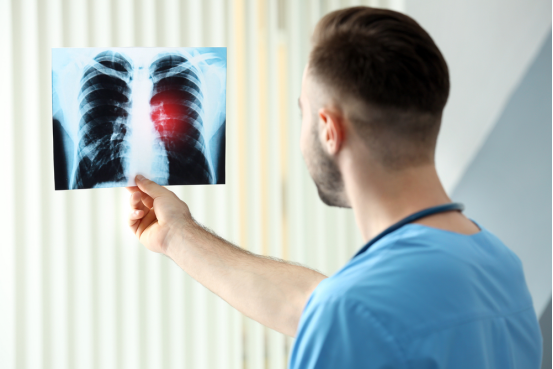Lung cancer is the most serious type of cancer and accounts for nearly 27% of all cancer deaths in the country. With the increasing awareness about lung cancer, people have stopped smoking.
Abnormal cell growth in one or both lungs causes lung cancer. It usually attacks the cells lining the airways. They divide and form tumors which in turn block the lungs from supplying oxygen to the blood. Tumors that do not spread are called benign tumors. They are not too dangerous. However, tumors that spread and affect other organs are called malignant and are dangerous.

Primary lung cancer occurs in the lungs. Cancer that occurs in another organ and reaches the lungs (metastasizes) is called secondary lung cancer.
Here is some information about lung cancer risk factors, diagnosis, symptoms and treatment options.
What are the risk factors for lung cancer?
- Smoking and the consumption of tobacco products in the form of cigars and pipes are the main causes of lung cancer. Tobacco smoke is toxic and can cause cancer in people who smoke passively. Smoking can also cause cancer of the mouth and throat, larynx, trachea, bronchi, esophagus, stomach, colon, rectum, liver, pancreas, kidneys, pelvis, bladder and cervix. In addition, smoking can also cause acute myeloid leukemia.
- Radon is a naturally occurring gas that is found in soil and rocks and can be trapped in buildings and homes. It is odorless and tasteless, so it is not easily detected. According to lung cancer research data, radon causes nearly 200,000 cases of lung cancer nationwide. It is estimated that 1 in 15 homes has high levels of radon. Therefore, it is important to test homes for radon regularly.
- If a person survives lung cancer, there is a chance that their healthy lungs will develop cancer again, especially if they smoke. In addition, if there is a family history of cancer, a person may be at a higher risk of lung cancer.
How is lung cancer diagnosed?
- Lung cancer may not be detected until it has spread or reached an advanced stage. If a patient feels that they may be at risk for lung cancer, it is important to see a doctor immediately and get tested.
- If a patient is coughing up blood in their sputum, the sputum may need to be tested to see if cancer cells are present. This process is called sputum cytology.
- Early-onset lung cancer can be detected through X-rays or computed tomography (CT) scans. These tests show if there are any strange and abnormal growths or lesions in the lungs.
- Depending on the stage of the cancer, further scans such as positron emission tomography (PET), magnetic resonance imaging (MRI), and bone scans may be done to get a clearer picture of the cancer and determine a treatment plan. These tests are case-specific, so it is best to get the tests your doctor recommends.
What are the symptoms of lung cancer?
- There is not just one specific type of symptom for lung cancer. It can be different in each case. It often goes undetected until it spreads to other organs.
- Common symptoms include a persistent cough, blood in the sputum, chest pain, fatigue, and unexplained weight loss.
- Sometimes, patients may experience persistent bouts of pneumonia and enlarged or swollen lymph nodes between the lungs, causing pressure on the chest.
How is lung cancer treated?
Treatment plans for lung cancer are determined by doctors based on the needs and stage of the cancer. Some common treatment plans for lung cancer include:
- Surgery– Doctors usually recommend surgery if the cancer is limited to the lungs. During surgery, the surgeon removes the cancerous tissue and a small portion of healthy tissue.
- Radiation therapy– Often used in combination with chemotherapy, it can be given before or after surgery as needed. This treatment uses high-energy proton beams and X-rays to kill cancer cells.
- Chemotherapy– Chemotherapy is usually given after surgery to kill any remaining cancer cells. The drugs used can be taken orally or intravenously.
- Other Options– There are many other treatments for lung cancer, such as immunotherapy, radiosurgery, targeted drug therapy, and more. Patients can also participate in clinical trials, where doctors test new drugs and treatments depending on the type of cancer.




